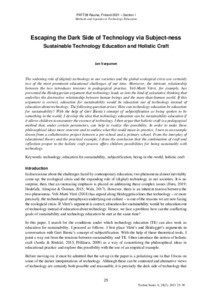Escaping the Dark Side of Technology via Subject-ness: Sustainable Technology Education and Holistic Craft
Varpanen, Jan (2021-04-26)
Varpanen, Jan
26.04.2021
Julkaisun pysyvä osoite on
https://urn.fi/URN:NBN:fi:tuni-202112219478
https://urn.fi/URN:NBN:fi:tuni-202112219478
Kuvaus
Peer reviewed
Tiivistelmä
The widening role of (digital) technology in our societies and the global ecological crisis are certainly two of the most prominent educational challenges of our time. Moreover, the intricate relationship between the two introduces tensions in pedagogical practice. Veli-Matti Värri, for example, has presented the Heideggerian argument that technology leads us into the kind of calculative thinking that underlies the destructive relationship between human beings and the more-than-human world. If this argument is correct, education for sustainability would be education out of technology instead of education about technology. The following question arises: How can technology education be education for sustainability? With the help of Gert Biesta’s concept of subjectification as being spoken to by something in the world, I develop the idea that technology education can be sustainability education if it allows children to encounter the essence of technology. I then argue that holistic craft is a pedagogical method that, under certain parameters, can help to realize this possibility. In order to make these philosophical ideas more concrete and to outline what this could mean in practice, I turn to an example drawn from a collaborative project between a pre-school and a primary school. From the interplay of educational theory and the practical example, I draw the conclusion that the combination of craft and reflection proper to the holistic craft process offers children possibilities for being sustainably with technology.
Kokoelmat
- TUNICRIS-julkaisut [16929]
